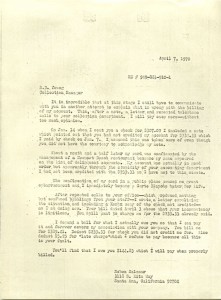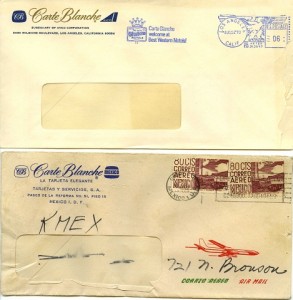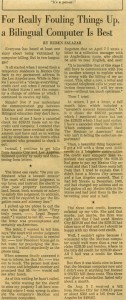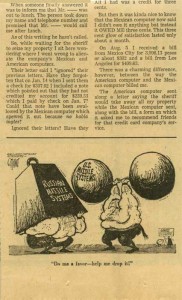Salazar Battles ‘Embarrassing’ Credit Card Fiasco
Ruben Salazar was embarrassed when a nice meal at a Newport Beach restaurant ended with his credit card being confiscated by the restaurant’s management. Even more troubling was that the incident could have been avoided if the credit card company had paid attention to the payment, many phone calls, and correspondence from Salazar to settle his account before going into the restaurant.
“After repeated calls to your office, which produced nothing but confused babblings from your staff I wrote a letter explaining the situation and including a Xerox copy of the check not credited as I am doing now,” wrote Salazar in a letter to the collection manager of Carte Blanche credit card company on April 7, 1970.
Salazar was extremely infuriated by having his card confiscated by the restaurant because his name appeared on a list of delinquent accounts.
“My account was actually in good order, but apparently through the stupidity of your accounting department I had not been credited with the $239.33 as I have not to this minute,” wrote Salazar in the letter, referring to his earlier payment.
In addition to being a journalist Salazar was also a human being and in the letter he wrote to the collection manager of Carte Blanche he demonstrated his feelings and stern personality as he stood for what he felt was right.
“The confiscation of my card in a public place caused me great embarrassment and I immediately became a Carte Blanche hater for life,” wrote Salazar.
Based in Mexico for the Los Angeles Times from 1966 through 1968, Salazar’s credit card problems were not unusual for foreign correspondents making payments for travel, hotels, meals and other things while covering stories abroad.
“There will always be money problems because that is just part of the job,” said Michael Parks, USC Professor of Journalism and Times foreign correspondent in 1987.
While in Mexico Salazar obtained a “charge everything” credit card from the Times and according to Parks this is fairly common for foreign correspondents. But, Salazar never imagined the chaos that this convenience would cause him upon his return to California. He wrote a Times column on August 21, 1970 and put the card’s behavior in the spotlight.
The fiasco began when Salazar received a canceled check that he made payable to the credit card company for the amount of $239.33, but that was not credited to the proper account.
“Instead, I continue to get bills from Mexico City and Los Angeles, followed quickly by nasty and threatening form letters,” wrote Salazar in his column.
In the letters Carte Blanche said he could be sued for a delinquent account and that the Sheriff could seize his property such as automobile, land, house, bank account or salary. In addition he was told he would need to pay litigation costs and attorney fees.
After these threats were received Salazar was notified he had actually been credited with .03 cents to his Mexico City account and that gave him a sense of relief. The $239.33 bill had cleared and was credited with .03 cents.
His “three cent glow of satisfaction lasted only about a month,” Salazar wrote in the column, because he later received a bill from Mexico City for $302 on August 5, 1970 and another bill from Los Angeles office for $409.63.
The credit card mix-up between Mexico City and Los Angeles offices was also not unusual for foreign correspondents. Parks recalls his own American Express fiasco when he was a foreign correspondent.
“They had opened up a different account number in my name and that’s where the charges went, but I had the old account number and that’s where my payments went. So over the course of about a year the charges got up to $130,000. And I had a credit balance in the other account of about $130,000. But I did not know about the change because I did not receive the letter so I continued to send them checks to the old account,” said Parks.
He fixed the issue by physically going into an American Express office and merging both accounts so that they would balance out.
According to Parks, in Salazar’s era Carte Blanche was owned by the Hilton Hotels and competed with other credit cards such as American Express and Diner’s Club. Hilton Hotels sold Carte Blanche to City Bank about 30 years ago and since then has been phased out, he said.
To this day it is unclear as to how this credit card dispute unfolded because there are no other documents about this incident. However, it is clear that Salazar felt the blame was on Carte Blanche’s side. In his letter to the company he expressed the anger of many who feel shortchanged by a credit card company.
“Your bill dated April 3 shows that your incompetency is limitless. You still want to charge me for the $239.33 already paid. I demand a bill for what I actually owe you so that I can pay it and forever severe my association with your company. Also deduct $5.25 for ‘late charge’ which I refuse to pay because all this is your fault,” Salazar closed his letter to Carte Blanche.






[…] USC Annenberg students. They are: Elaine Baran, Melissa Caskey, Juan Espinoza, Regina Graham, Gustavo Gutierrez, Grace Jang, Elena Kadvany, Bianca Ojeda and Frances […]
[…] students were: Elaine Baran, Melissa Caskey, Juan Espinoza, Regina Graham, Gustavo Gutierrez, Grace Jang, Elena Kadvany, Bianca Ojeda and Frances […]
[…] http://rubensalazarproject.com/2012/04/17/salazar-battles-embarrassing-credit-card-fiasco-2/ Like this:LikeBe the first to like this. […]